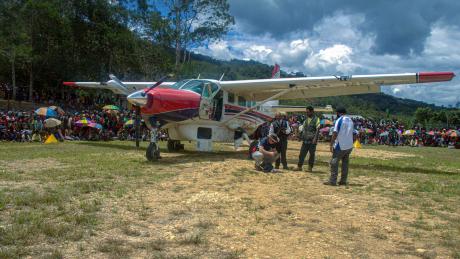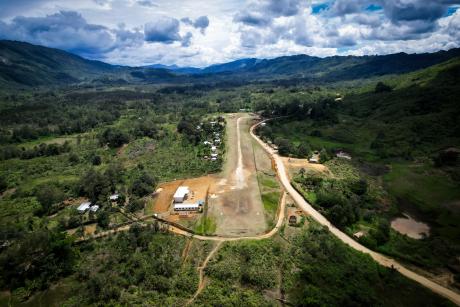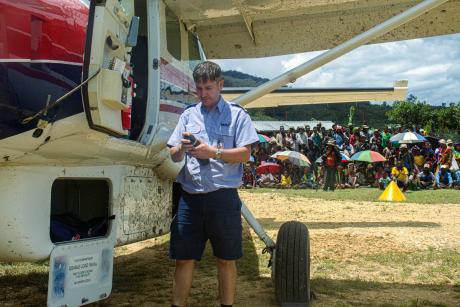
A road connects this remote PNG community with the nearest township, but it is so dangerous that locals worked hard to get their airstrip open for the first time in many years.
Story by Kowara Bell
Lucas Andu knows that a road doesn’t end isolation when families don’t feel safe travelling amid tribal warfare, crime and deteriorating conditions.
So, after years without access to flights, the people of Auwi were celebrating when a MAF plane made its first landing recently on the rebuilt airstrip.
Despite the fact that Auwi/Pori has a road link to its nearest Provincial Capital Tari, people are afraid to use it because there have been numerous and ongoing life-threatening situations due to tribal warfare, criminal activity, and bad road conditions.
Lucas, a healthcare officer, and local spokesperson said words cannot express what the people of Auwi had gone through over the years without an airstrip.
“Although we have a road access, many refuse to travel on it because of the issues faced along the highway link. It is also difficult to bring in medicinal supplies via road because they are frequently hijacked by robbers, and too many commuters are robbed most of the time, leaving Auwi to be isolated and deprived," he said.
“However, seeing a MAF plane landing on our upgraded airstrip after many years, ignites joy in our hearts as we know that Auwi people will immensely benefit from MAF service without being afraid of our safety.”
According to Mathias Glass, a long-serving MAF PNG pilot, his last landing at Auwi airstrip via a MAF Twin Otter was on September 11, 2007.
“I remember the landing in Auwi being challenging because of the location at the bottom of the valley near the ridgeline. The location was prone to turbulence in the circuit. In addition to the location, the airstrip was short and flat,” Mathias said.

With the assistance of Rural Airstrip Agency (RAA), the Auwi community made a big effort to rehabilitate and upgrade their airstrip, which was closed almost seventeen years ago.
Technical Advisor for Rural Airstrip Agency (RAA), Jonny Watson, commended the people of Auwi for putting much of their effort into making the airstrip usable again.
“It is wonderful to see a very happy community with an airstrip that is now open to use. They have a road link however, it’s not always safe for them to use it,” he said.
“We were able to go there to do a survey and to provide the information to MAF for flight risk assessment for the MAF plane to go and land on the airstrip.
“Moreover, we hope to get some ongoing funding from the district or provincial government in order to help the community to continue maintaining the airstrip.”
Meanwhile, MAF PNG Pilot Andy Symmonds, who conducted the test landing, also commended the locals for restoring the runway to a functional condition and urged them to maintain the airstrip so MAF can schedule more flights into Auwi.
“It is a privilege for MAF to be of service to you, but for MAF to do so, I urge the community to maintain your airstrip by regularly mowing the grass on the runway and trim down any overgrown trees near the airstrip so that it will be usable in the years to come,” Andy added.

Situated in a rural local level government of Koroba Kopiago district, in the newly established Hela Province, Auwi is known to be in one of the least developed areas of the highlands region of Papua New Guinea.
Auwi airstrip is among hundreds of remote airstrips in the country that are undergoing rehabilitation as part of the restoration and maintenance airstrip initiative run by RAA, in partnership with the PNG government, to help the remote population access a much safer and reliable mode of transport to their area.